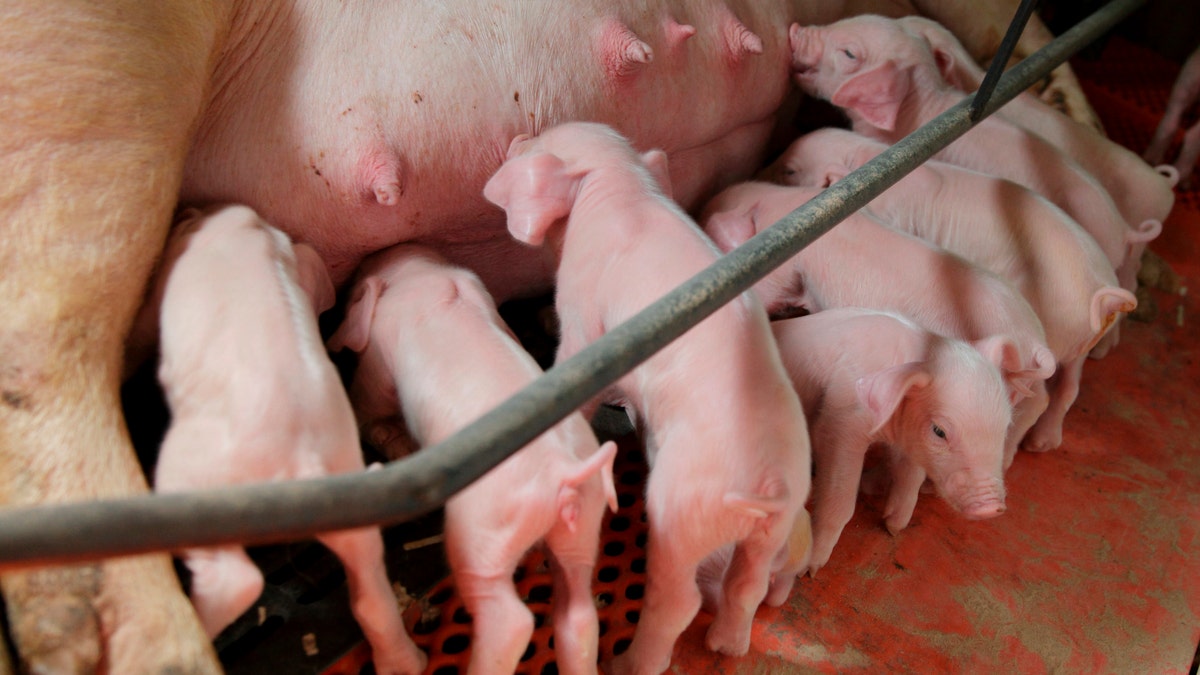Feed ingredient unlikely to spread killer pig virus, experts say
{{#rendered}} {{/rendered}}
Newborn piglets suckle at Whiteshire Hamroc farm in Albion, Indiana March 16, 2012. The animals here at the Whiteshire Hamroc farm have been bred for one purpose: to be flown halfway around the world, on a journey fueled by China's appetite for food independence. In a country where pork is a culinary staple, the demand for a protein-rich diet is growing faster than Chinese farmers can keep up. While Americans cut back on meat consumption to the lowest levels seen in two decades, the Chinese now eat nearly 10 percent more meat than they did five years ago. Picture taken March 16, 2012. To match INSIGHT USA-CHINA/FOOD REUTERS/John Gress (UNITED STATES - Tags: FOOD AGRICULTURE BUSINESS ANIMALS) - RTR30Z07 (REUTERS/John Gress)
The World Organization for Animal Health said on Wednesday that an animal-feed supplement suspected of spreading a deadly pig virus is not likely to transmit the disease if manufacturers follow proper safety measures.
Multiple studies suggest that spray-dried porcine plasma, a supplement containing pigs' blood that is fed to piglets, is not a likely source of Porcine Epidemic Diarrhea virus (PEDv) "provided that good manufacturing practices and biosecurity standards are followed," the organization, known as the OIE, said in a fact sheet.
The findings represent an important development in the global effort to identify the methods in which PEDv is transmitted.
{{#rendered}} {{/rendered}}The virus has killed an estimated 8 million piglets, or 13 percent of the U.S. hog herd, since it was first identified in the United States last year, pushing U.S. pork prices to record highs. The disease has also been found in Mexico, Canada, Japan and other countries.
Blood products, such as spray-dried porcine plasma, are used around the world in the diets of piglets and had been considered potential carriers of PEDv because they contains pigs' blood.
The conclusion that porcine plasma is not likely to spread the disease gives a boost to feed manufacturers, which had come under scrutiny amid concerns about their products.
{{#rendered}} {{/rendered}}The findings were based on scientific work of an OIE ad hoc group on PEDv and highlight the feed industry's "strong commitment to feed safety," the International Feed Industry Federation said in a statement.
However, the OIE, which sets global standards on policies affecting animal health, confirmed that feed is among the objects that can transmit PEDv indirectly if it is contaminated with feces carrying the disease.
Researchers had previously established that PEDv was transmitted from pig to pig by contact with manure that contains the virus. It can also be spread from farm to farm via trucks, personnel or feed that are contaminated with feces, according to OIE.
{{#rendered}} {{/rendered}}"Feed could play a role, most probably as a vehicle not as a contaminant itself," said Paul Sundberg, vice president of science and technology for the National Pork Board.
In May, the European Commission strengthened its rules on imports of pig blood products for use in hog feed in a bid to keep out PEDv.
Canada first alarmed the farm and feed industries in February when it said it had determined the virus was present in samples of U.S.-origin plasma. It was unclear whether the feed was capable of causing the disease in piglets.
{{#rendered}} {{/rendered}}In the United States, the Food and Drug Administration has reviewed the manufacturing process of one company that produces dried pig plasma used as a feed supplement.
